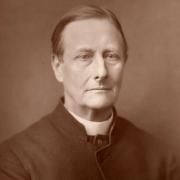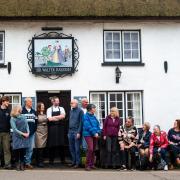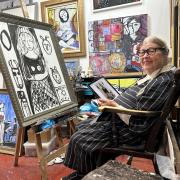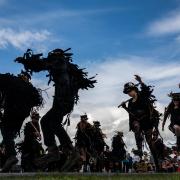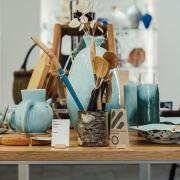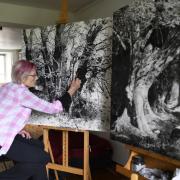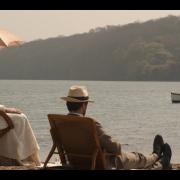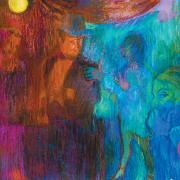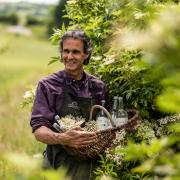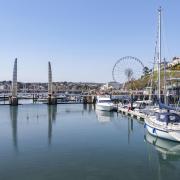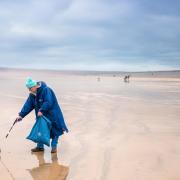Simone Stanbrook-Byrne heads underground to meet the founders of theatre company Four of Swords. Their stage may be deep in a cave or in the historic setting of a National Trust house, either way, they are sure to create an unforgettable experience.
The day wanes into dimpsy on the tree-clad hillside above Beer Quarry Caves; a frisson of expectation shivers the assembled watchers. Masked and hooded figures appear out of the gloom, conversing in speech not quite of the modern age. They beckon us to follow, leading us down; down between fern-upholstered banks, through a grilled portal in the cliff face and deep, deep into a subterranean world.
Incense wafts to meet us; flickering candles entice us further in, to a place inhabited by the unknown. Shadows leap. Then suddenly the gloom dispels and we behold gloriously adorned and masked regal figures, stark contrast to the peasant garb of our guides. Silvery, other-worldly chanting fills the space like a physical presence, overwhelming the senses, drawing us further into surreality and into the twilight zone of Oedipus. Immersive theatre, unlike anything most of us have experienced before, has begun.

No one will ever forget their first encounter with Four of Swords, a theatre company that first performed in 2013. It is the inspired creation of Philip Kingslan John and Sarah White, who met on a community theatre project when Phil was directing his new translation of a play from the Grand Guignol, a Parisian theatre famous for its drama of the macabre.
‘Sarah and I both felt frustrated that no one locally seemed to be making the kind of theatre we really wanted to see,’ says Phil, ‘something rich, bombastic and which dared to break the rules of conventional staging. I’d never heard the expression ‘immersive theatre’ back then, but that’s what we were imagining.’
‘We wanted an experience that was beyond sitting in an auditorium,’ continues Sarah. ‘Something alive, where reality was set on pause and for that moment you became inhabitants of a different world. Something that swept you up and happened all around you in spaces that were atmospheric and transporting, so we made Jekyll & Hyde, and set it in Poltimore House, using the fabric of the building to create Victorian streets and Jekyll’s laboratory.’

All Four of Swords productions enlist a sizeable, versatile and staggeringly talented cast. Sarah tells me she loves working with large casts as it ‘elevates the show,’ and, she feels, it’s a treat for audiences to be surrounded by so many actors.
Phil, who for years worked as an English teacher, says: ‘We’ve been very lucky to accumulate a pool of skilful and talented performers, and tend to cast one or two new people per show. What we’ve learned is to prize open-mindedness, reliability and diverse skill-sets over mercurial Marlon Brando style brilliance. Because we have decent-sized casts but generally very small (often non-existent!) crews, it’s necessary for people to pull double or triple duties, so it’s great for us to work with excellent actors who are also knowledgeable about sound, film, lighting, prop building, choreography and so on.’
Both Sarah and Phil grew up in Devon and working with local artists and performers is an important part of their ethos. They aim to ‘contribute to pathways to careers in the arts by employing early-career artists or graduates,’ says Sarah. ‘We need to keep the talent in the area and not let artists feel like they have to move to larger cities to gain employment. When we can, we’ll always offer internships or work experience opportunities.’

An arresting part of the visual experience is the extraordinary, unmissable makeup. I wonder how they would describe it themselves.
‘Fantastical, tribal, macabre... are some of the words I’d use!’ laughs Sarah. ‘We’re heavily inspired by our love for folk, myth and horror. The design is important in creating that sense of other-worldliness that we strive for in most of our shows.’
‘Sarah and I both enjoy bold make-up designs - we don’t often go for subtle!’ adds Phil. ‘Jekyll & Hyde featured a make-up design for the main character inspired by Japanese Kabuki and Chinese opera and occasionally, when we’re after a particular effect, we’ve worked with specialists such as BAFTA-winning TV make-up artist Simon Tytherleigh [also based in Devon], who helped us to realise our ambitions for the creature design in our version of Frankenstein.’
Over the years Phil and Sarah have gleaned as many make-up tips as they can from experts in the field and now mostly create the designs themselves.

I pick up on their ‘love for horror’. In Oedipus, Sarah made an endearingly funny demon who ‘just wanted to go home’, but most of their work is enticingly ‘dark’. I ask if they ever experiment with different genres, and am told that Sarah’s mum often asks them when are they going to do something ‘nice’.
‘Clearly we’re drawn to the darker side of things!’ says Phil. ‘We love creepy stories. We’re both massive fans of horror cinema. Plus, the scary stories are fun to do.’ He thinks for a moment. ‘But not everything we’ve done has been oppressively harrowing. Gawain & the Green Knight in Exeter Cathedral and Jason & the Argonauts were both family shows and were very enjoyable to do.’
Having experienced subterranean productions of Macbeth and Medea as well as Oedipus, I’m certainly left with the impression that ‘dark’ is their forte, an impression reinforced by Sarah’s: ‘Sorry, mum, I don’t do ‘nice’!’

And the soundscape. That wonderful, ethereal music that weaves itself into the soul, binding listeners in an aural spell...
They have worked with several talented and generous musicians and sonic experts over the years. Sarah says: ‘Each show has a different requirement in musical design. For our gothic tales, which have been performed in stately homes, we used live actor-musicians playing cello, flutes and violins. In the development of Nineteen Eighty Four which will be set in a more urban space, we’ve been playing with electronic sound. And in the caves we used the amazing acoustics they offered and created an acapella chorus. This particular soundscape was inspired by Bulgarian folk singing, Irish keening and our favourite band: Heilung. All of these are vocal ritual artforms, so it felt right for Medea and Oedipus which had the idea of ritual deeply embedded in the story.
Each extraordinary location is itself part of the production and becomes a huge, structural member of the cast. They range from stately homes, like Poltimore and Great Fulford, through historic buildings such as St Nicholas Priory, and urban industrial spaces, such as Positive Lights in Exeter, to ‘ancient, primal locations’ like Beer Quarry Caves.

‘It’s crucial to be as open as possible to the space and to the dramatic opportunities that it suggests,’ says Phil. ‘The way we work, it’s also important to consider the distances between scenes, and the length of the audience journey overall, in terms of not exhausting people, nor allowing too many opportunities for the spell of immersion to be broken.’
He says that privately managed venues that don’t need head-office approval are generally easier and more streamlined to work in, and adds that ‘we’ve been looking for a good military bunker for a while. And we’d also love to use some historically recreated spaces such as a Bronze Age round house or a Viking mead hall.’
I’d absolutely love to host a Four of Swords production, but I don’t own a bunker or anything Bronze Age or Viking. If anyone out there does...
Four of Swords is presenting Cyclops, a free outdoor performance as part of Exmouth Festival on July 19-21 and will return to Beer Quarry Caves for Macbeth in September (dates TBC).
four-of-swords.com






